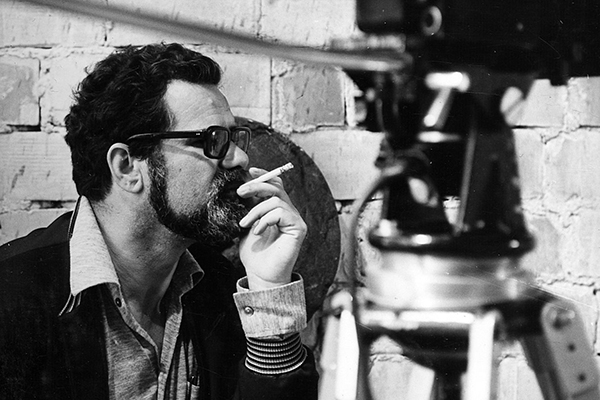Konrad Wolf,
free thinker of East German cinema
PostED ON 12.10.2025
It is rare for a filmmaker's life to be as astonishing as his films, but such is the case with Konrad Wolf, whose destiny encompassed a whole expanse of the 20th century.

© DEFA Stiftung Alexander Kuehn Wolfgang Bangemann
Konrad Wolf
Born in Germany in 1925, Konrad Wolf directed some fifteen films between 1955 and 1980. The son of a Jewish communist family, he moved to Moscow in 1933 to flee the Nazis. His return to his native country in 1945 as a very young soldier in the Red Army was the source of his autobiographical film, I Was Nineteen. Wolf's entire life was marked by a dual identity: Soviet and East German. In 1949, he studied film in Moscow, then in East Berlin of the 1950s, in the GDR, he became a director whose filmography centred on Germany and its complexity, or more specifically, how feelings like love, betrayal and melancholy can lead to magnificent political consciousness. In Lissy, for example, a young female office worker faces the rise of Nazism in the 1930s. Stars tells the story of soldier Walter, who wants to save Ruth, a young Jewish girl, from the concentration camps. Stars was the first German work to address the Holocaust and received the Jury Prize at Cannes in 1959.
The other major period in Wolf's life was spent within the Soviet bloc, a utopia the filmmaker wanted to believe in. He shot his era with a critical gaze toward society, yet always portrayed his female characters with benevolence. In Divided Heaven, he traced the poetic footsteps of a young factory worker and her dreams of a shared life. He trotted alongside a folk singer dissatisfied with life in the GDR in Solo Sunny, directed with Wolfgang Kohlhaase. The main protagonist, played by Renate Krößner garnered the Best Actress Award at the 1981 Berlin Film Festival for her performance. ‘I never met Konrad Wolf,’ commented Wim Wenders (honoured with the Lumière Award in 2023), ‘but I would have loved to have shown him one of my films shot in the same divided city, with a very similar title, even if a quarter of a century later, Wings of Desire would depict a shared sky, a unified paradise. When I first had the chance to screen Paris, Texas in East Berlin in 1984, Konrad Wolf had died two years beforehand. At that time, I had seen Busch singt and Solo Sunny, and I deeply regretted having missed the chance to meet my great East German colleague. But missed opportunities are unfortunately the story of so many relationships between West and East Germans...’
President of the East Berlin Academy of Arts from 1965 until his death in 1982, Wolf created a series of novelistic narratives, tinged with romanticism. His films were focused on the emancipation of beings, on authentic landscapes and documentaries. Discovering East Berlin, a city to which the filmmaker would always remain loyal, despite travelling the world, is what makes his œuvre so moving.
Virginie Apiou
Screenings
Lissy by Konrad Wolf (1957, 1h29)
Institut Lumière (Hangar) Tue14 9.15am | Institut Lumière (Villa) Wed15 2.30pm | Institut Lumière (Villa) Fri17 7pm | Institut Lumière (Villa) Fri17 7.15pm
Stars by Konrad Wolf (Sterne, 1959, 1h32)
Institut Lumière (Hangar) Wed15 9am
Divided Heaven by Konrad Wolf (Der Geteilte Himmel, 1964, 1h54)
Pathé Bellecour Sun12 11.15am | Institut Lumière (Villa) Mon13 11.15am | Institut Lumière (Villa) Mon13 11.30am
I Was Nineteen by Konrad Wolf (Ich war neunzehn, 1968, 1h55)
Lumière Terreaux Fri17 10.45am | Institut Lumière (Villa) Sat18 2.15pm | Institut Lumière (Villa) Sat18 2.30pm
Solo Sunny by Konrad Wolf et Wolfgang Kohlhaase (1980, 1h42)
Institut Lumière (Villa) Thu16 11.15am | Institut Lumière (Villa) Thu16 11.30am | Pathé Bellecour Sat18 9.30pm

